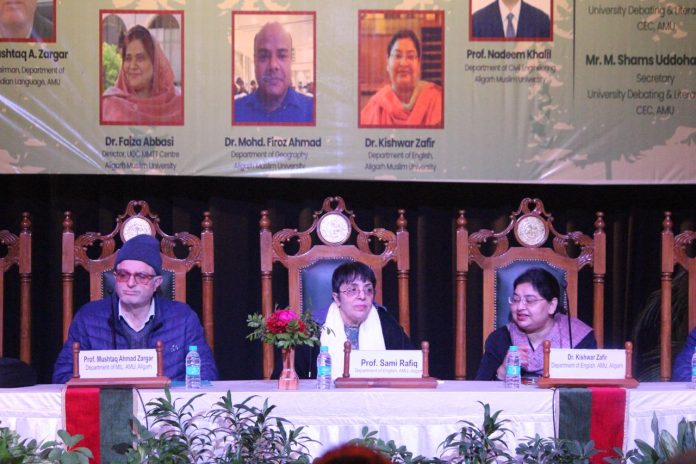Aligarh: The University Debating and Literary Club (UDLC), Aligarh Muslim University organised a Roundtable Symposium on “Climate Change at the Crossroads: Biodiversity, Sustainability, Technology and Culture” at the Kennedy Auditorium, Cultural Education Centre, AMU.
Prof. Mohd. Naved Khan, Coordinator, CEC, delivered the introductory remarks while Prof. Nazia Hasan, President, UDLC, welcomed the guests.
The event started with Prof. Sami Rafiq, Department of English; Prof. Mushtaq Zargar, Former Chairperson, Department of Modern Indian Languages; Prof. Aysha Munira Rasheed, Department of English and Dr Kishwar Zafir, Department of English discussing “Storytelling in the Age of Crisis: Narratives on Climate”.
Prof Rafiq recited two of her compelling poems, namely, “Diggi Lake” and “Woman from Aligarh” from her new poetry collection titled “Songs of Aligarh”.
She said, “The resolutions on climate change are not difficult. It goes down to individual effort. If individuals take an interest, nobody can stop them. We should stop blaming the government for everything and work at our level to see the positive change.”
Prof Zargar traced for the audience the scenic panorama of Kashmir’s burgeoning eco-narratives. The audience enjoyed his childhood anecdotes and felt the impact of climate change both in his voice and words.
Prof Aysha Munira Rasheed talked about Sir Muhammad Iqbal’s poem “Naya Shiwala”, adding, “Though the main idea in the poem is patriotism, love for your country, however, Iqbal is talking about the landscape of India and he is expressing his attachment to the physical nature, the phenomenon that India has, its beauty, flora and fauna.”
Moving the discussion ahead, Dr Kishwar Zafir said, “Climate Fiction is fast becoming the signature genre of the 21st century. We have novels and stories that talk of climate and environment and link all of these with human nuances and scale people into apocalyptic mode.”
Prof. Azra Musavi, Director, Advanced Centre for Women’s Studies, began the second panel discussion on “Climate Science Frontiers: Innovations and Breakthroughs”.
She said, “As a social scientist, I have the responsibility of drawing everyone’s attention to the fact that there are certain human concerns which are not being addressed in the climate change policies, processes and innovations.”
She emphasised climate justice for marginalised communities and how different sections are disproportionately affected by climate change.
Prof. Nadeem Khalil, Department of Civil Engineering, in his presentation, elaborated on different kinds of emerging technologies we have developed to combat climate change forces. He discussed various projects he undertook, further emphasising on nature-based solutions for waste water management and short rotation forestry.
Dr. Faiza Abbasi, Director, UGC HRD Centre, emphasised on the detrimental effects of waterbody and wetland loss on essential biodiversity. She explained how these ecosystems serve as vital habitats for countless species, playing a crucial role in maintaining ecological balance. Their degradation leads to the extinction of flora and fauna, disrupting food chains and ecosystem services.
Dr. Mohd. Firoz Ahamed, Department of Geography, provided a technical perspective on the multifaceted impact of climate change. While acknowledging certain localised benefits, he explained why climate change, when viewed holistically, is a disastrous event for humanity.
Mohd. Shams Uddoha Khan, Secretary, UDLC conducted the program and thanked the guests for gracing the occasion.
The symposium was attended by many faculty members and more than 120 students who participated actively in the discussion. Prof. Anwar Shahzad, President, Eco Club; Prof. Kamlanand Jha, President, University Drama Club and Dr Danish Mahmood, President, Western Music Club were present at the event.




